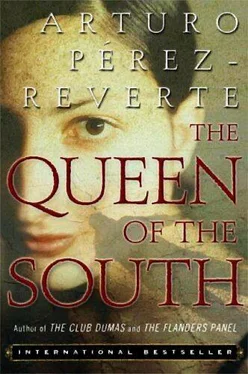Arturo Perez-Reverte - Queen of the South
Здесь есть возможность читать онлайн «Arturo Perez-Reverte - Queen of the South» весь текст электронной книги совершенно бесплатно (целиком полную версию без сокращений). В некоторых случаях можно слушать аудио, скачать через торрент в формате fb2 и присутствует краткое содержание. Жанр: Триллер, на английском языке. Описание произведения, (предисловие) а так же отзывы посетителей доступны на портале библиотеки ЛибКат.
- Название:Queen of the South
- Автор:
- Жанр:
- Год:неизвестен
- ISBN:нет данных
- Рейтинг книги:5 / 5. Голосов: 1
-
Избранное:Добавить в избранное
- Отзывы:
-
Ваша оценка:
- 100
- 1
- 2
- 3
- 4
- 5
Queen of the South: краткое содержание, описание и аннотация
Предлагаем к чтению аннотацию, описание, краткое содержание или предисловие (зависит от того, что написал сам автор книги «Queen of the South»). Если вы не нашли необходимую информацию о книге — напишите в комментариях, мы постараемся отыскать её.
Queen of the South — читать онлайн бесплатно полную книгу (весь текст) целиком
Ниже представлен текст книги, разбитый по страницам. Система сохранения места последней прочитанной страницы, позволяет с удобством читать онлайн бесплатно книгу «Queen of the South», без необходимости каждый раз заново искать на чём Вы остановились. Поставьте закладку, и сможете в любой момент перейти на страницу, на которой закончили чтение.
Интервал:
Закладка:
She didn't have much time. She'd forgotten her watch, too, but she saw that it would be night soon. The street looked quiet-normal traffic, normal people walking normally down the street, nobody standing around. She put her shoes on. She left ten pesos on the table and got up slowly, gripping the gym bag. She didn't dare look at herself in the mirror when she left.
At the corner, a kid was selling soft drinks, cigarettes, and newspapers set out on a flattened cardboard box that read "Samsung." She bought a pack of Faros and a box of matches, stealthily looking over her shoulder, and then walked on with deliberate slowness. The Situation. A parked car, a cop, a man sweeping the sidewalk-they all spooked her. The muscles in her back were aching again, and there was a bitter taste in her mouth. The high heels were bothering her, too. If Guero had seen her, she thought, he'd have laughed. And she cursed him for that, deep inside. Laughing out the other side of your mouth now, aren't you, pinche cabron You and that macho attitude of yours, you and those fucking brass balls of yours, you and.., She caught the smell of burned flesh as she passed a taqueria, and the bitter taste in her mouth suddenly got worse. She had to stop and duck into a doorway, where she vomited up a slimy greenish thread of nopal.
I knew Culiacan. Before my interview with Teresa Mendoza, I had been there, right at the beginning, when I started researching her story and she was no more than a vague personal challenge in the form of a few photographs and press clippings. I also went back later, when it was all over and I was finally in possession of what I needed to know: facts, names, places. So I can lay it out now with no more than the inevitable, or convenient, gaps. Let me mention, too, that the seed of all this was planted some time ago, during a dinner with Rene Delgado, editor of the newspaper Reforma, in Mexico City. Rene and I have been friends ever since as young reporters we shared a room in the Hotel Intercontinental in Managua during the war against Somoza. Now we see each other when I go to Mexico, talk over old times and new, avoid mentioning our gray hair and wrinkles. And that time, eating escamoles and tacos de polio at the San Angel Inn, he offered me the story.
"You're a Spaniard, you've got good contacts there. Write something dynamite about her for us."
I shook my head as I tried to keep the contents of the tortilla from dripping down my chin. "I'm not a reporter anymore. Now I make it all up, and I don't write anything under four hundred pages."
"So do it your way," Rene insisted. "Write a fucking literary piece."
I finished off the taco and we discussed the pros and cons. I hesitated until the coffee and the Don Julian No. 1 came, just when Rene was threatening to call the mariachis over. But his little stratagem backfired on him: The story for Reforma had turned into a private book project, although our friendship didn't suffer on that account. Quite the contrary: The next day he put at my disposal all his best contacts on the Pacific coast and in the federal police force so I could fill in the dark years-the stage of Teresa Men-doza's life that was unknown in Spain, and not in the public domain even in Mexico.
"At least we'll review it," Rene said, "cabron."
At that time, about the only things known publicly about Teresa Men-doza were that she had lived in Las Siete Gotas, a poor barrio in Culiacan, and that she was the daughter of a Spanish father and a Mexican mother. Some people also knew that she'd dropped out after elementary school and a few years later gone to work as a salesgirl in a sombrero store in the Buelna mercado, then become a money changer on Calle Juarez. Then, one Day of the Dead afternoon-life's little ironies-fate set her in the path of Raimundo Davila Parra, a pilot for the Juarez cartel. In that world, he was "Guero" Davila. "Guero" was Mexican slang for a blue-eyed, blond-headed gringo, which Guero wasn't, exactly, since he was a Chicano from San Antonio, but the name stuck.
All this latter stuff was known more from the legend woven around Teresa Mendoza than from documented sources, so to throw some light on that part of her life story I went to the capital of the state of Sinaloa, on the west coast of Mexico, at the mouth of the Gulf of California, and wandered through its streets and into its cantinas. I even followed the exact, or almost exact, route taken by Teresa on that last afternoon (or first, depending on how you look at it), when the telephone rang and she fled the apartment she'd shared with Guero Davila. I started at the love nest they had lived in for two years: a comfortable, discreet two-story house with a patio in back, crepe myrtle and bougainvillea at the door, located in the southeast part of Las Quintas, a neighborhood that had become a favorite of middle-class drug dealers, the ones who were doing okay, but not well enough to afford a luxurious mansion in Colonia Chapultepec.
Then I walked along under the royal palms and mango trees to Calle Juarez, and in front of the little grocery store I stopped to watch the girls who, holding a cell phone in one hand and a calculator in the other, were changing money right out in the open. Or to put it another way, taking stacks of American dollars fragrant with cocaine or high-quality hashish from the sierra, and laundering it into Mexican pesos. In that city where breaking the law is often a social convention and a way of life-It's a family tradition, says one famous corrido, to break the law-Teresa Mendoza was one of those girls for a while. Until a black Bronco stopped one afternoon, and Raimundo Davila Parra lowered the smoked-glass window and sat there and stared at her from the driver's seat. And her life changed forever.
"Now she was walking down that same sidewalk, a sidewalk she knew
every inch of, with her mouth dry and fear in her eyes. She dodged the girls standing around in little groups talking, or pacing back and forth, waiting for customers in front of the El Canario fruit stand, and as she did so she glanced mistrustfully at the bus-and-tram station, the taquerias in the mercado-the street swarming with women carrying baskets and moustached men in baseball caps and sombreros. From the music store behind the jeweler's on the corner came the words and melody of "Pacas de a Kilo"-"Kilo Bricks"-sung by Los Dinamicos. Or maybe Los Tigres-from that distance she couldn't be sure, but she knew the song. Chale, she knew it all too well- it had been Guero's favorite, and that hijo de su madre used to sing it when he shaved, with the window open to annoy the neighbors, or whisper it in her ear, just to infuriate her:
My father's friends and colleagues
Admire me and respect me
And in two or three hundred yards
I can get planes off the ground.
I can hit any bull's-eye
With a pistol or machine gun…
Pinche Guero cabron, she thought again-fucking asshole prick, and she almost said it out loud, to control the sob that suddenly rose within her.
Then she looked right and left. She was looking for a face, a presence that meant danger. They would send somebody who knew her, she thought, somebody who could recognize her. So her hope lay in recognizing him before he recognized her. Or in recognizing them. Because there were usually two, so one could back the other one up, and also so they could keep an eye on each other, because this was a business where nobody trusted even his own shadow.
Somebody will smile at you, she remembered. And a second later, you'll be a dead woman. If you're lucky, she added for him, imagining the desert and the blowtorch that Guero had mentioned.
On Juarez, the traffic was coming from behind her. She realized this as she passed the San Juan monument, so she turned left, heading for Calle General Escobedo. Guero had explained that if you ever thought you were being followed, you should take streets where the cars come toward you, so you could see them coming. She walked on down the side street, turning from time to time to look back. She came to the center of the city, passed the white edifice of City Hall, and mingled with the masses of people crowding the bus stops and the area around the Garmendia mercado.
Читать дальшеИнтервал:
Закладка:
Похожие книги на «Queen of the South»
Представляем Вашему вниманию похожие книги на «Queen of the South» списком для выбора. Мы отобрали схожую по названию и смыслу литературу в надежде предоставить читателям больше вариантов отыскать новые, интересные, ещё непрочитанные произведения.
Обсуждение, отзывы о книге «Queen of the South» и просто собственные мнения читателей. Оставьте ваши комментарии, напишите, что Вы думаете о произведении, его смысле или главных героях. Укажите что конкретно понравилось, а что нет, и почему Вы так считаете.












